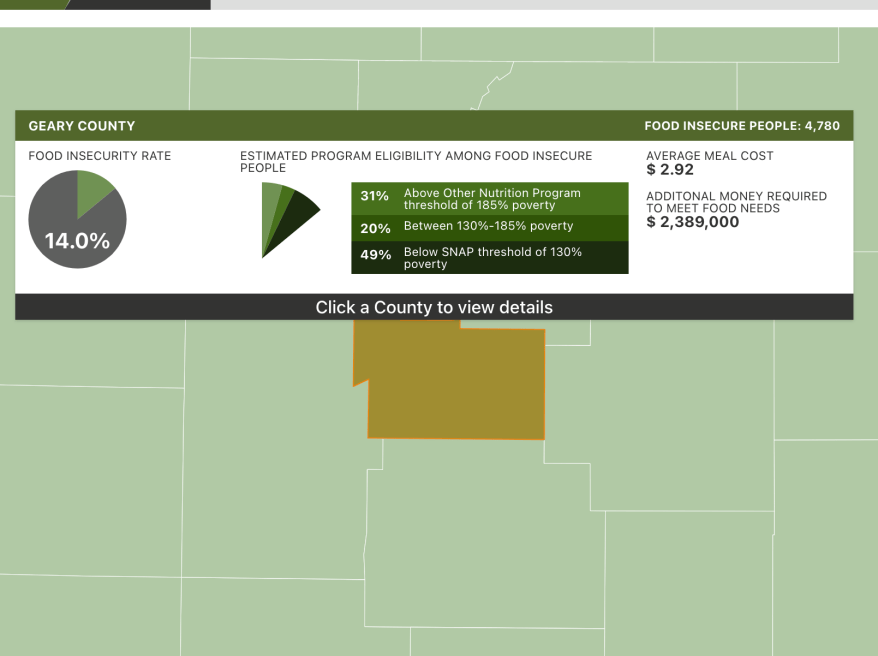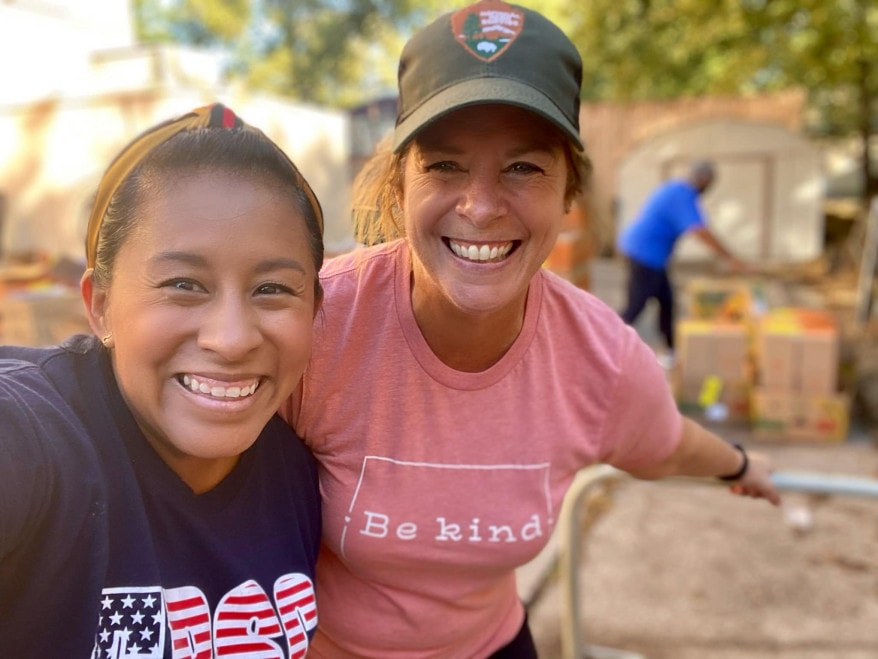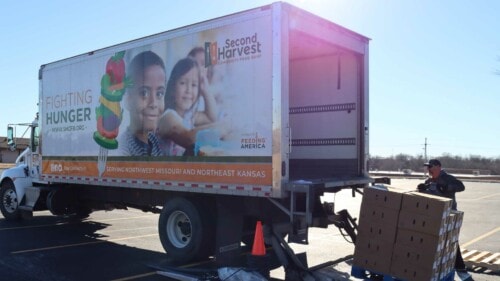Hunger in the Ranks: More Military Families Report Going Hungry 1 in 5 Military Families Report Food Insecurity, Much Higher Than in Previous Years
Published June 28th, 2022 at 6:00 AM
Above image credit: Military Family Advisory Network distributed over 1 million meals to military families last year as part of its initiative to alleviate military food insecurity. (Contributed | Military Family Advisory Network)FORT RILEY, Kansas – Taylor Rollins had gotten pretty good at stretching $125 across two weeks to feed her family of five.
It was a tough budget to keep. But now with gas prices and grocery store inflation skyrocketing, it’s nearly impossible to keep the refrigerator stocked.
Rollins’ husband joined the military several years ago, in part, so the family would have decent health insurance. Their middle child has a medical condition similar to Down syndrome and they wanted the best care possible for him.
As a military family, they never thought they would be food insecure.
“You want them (the children) to know that they’re taken care of, (that) they never have to worry,” Rollins said. “I do my best to put on a poker face and embrace the struggle so that they don’t see.”

Unfortunately, it’s a situation where a lot of families like the Rollins find themselves.
In 2021, the Military Family Advisory Network (MFAN) reported that about 20% of military survey respondents were food insecure. Just three years earlier, prior to the start of the COVID-19 pandemic, only 12% fit into the same category.
A resilient mindset, frequent relocation and an inability to qualify for food assistance programs are driving factors behind food insecurity of those in uniform. Advocates hope that as the issue gains attention, policies will change and more families will feel comfortable asking for the help they need.
“We know that, anecdotally, food insecurity is something that families have struggled with for a long time,” said Shannon Razsadin, MFAN’s president and executive director. “But because of the culture of resilience and pride in the military community, it’s something that has often gone under the radar.”
The nonprofit conducts research about emerging problems in military families. It started looking at food insecurity in 2016 and has since worked to elevate conversations around the issue, and to distribute food to the most in-need communities across the country.
Because the struggle has been largely hidden, there aren’t a lot of food-related resources on post. Razsadin said having a food pantry would provide some immediate assistance to these families, but certain causal factors would continue to exist.
One of the biggest factors at play – most military families are single-income households. It is very difficult for military spouses to get decent jobs because most families have to relocate every couple of years.
Child care can also be inaccessible, meaning a lot of military spouses stay home.
This is the case with Rollins, who is based at Fort Riley, Kansas.
Despite the circumstances, her family does not qualify for the Supplemental Nutrition Assistance Program (SNAP). They fall into a large category of folks, military or not, who are food insecure, but not deemed poor enough for food assistance programs.
In Geary County, where Fort Riley is based, 14% of the population was food insecure in 2019, prior to the COVID pandemic, according to Feeding America. Of those who regularly go hungry, about one-third have household incomes that exceed food assistance qualifications.
Hunger in Geary County

“Nobody listens to the low class or the middle class, they just think that because we’re poor, we don’t know what we’re talking about,” Rollins said. “But we’re the ones struggling.”
Razsadin said it’s also difficult for military families to qualify for SNAP because their housing allowance is included in the household income. She hopes in the future this will be reevaluated to ensure the lowest amount of the housing stipend is included.
“The reality is that the need is very real and a lot of military families have just been living on this bubble of just getting by,” Razsadin said. “I’m concerned that we have not seen the worst of this.”
Pandemic circumstances have prompted more folks to ask for help. Razsadin said it’s good to see more military families being okay with asking for help, but it also shows how dire the situation is.
The Rollins family just sold their second vehicle because they could no longer afford it. That means Rollins is home without a car most days, making it difficult to visit food pantries or other resources.
Recently, Rollins responded to a Facebook post in one of the Fort Riley groups and asked for a caring basket from another military wife and mom, Monica Bassett.
The basket had a week’s worth of food and other household essential items like disinfectant wipes and paper towels. Rollins and her husband don’t have family to fall back on when the going gets extra tough, so charitable acts and other resources mean a lot.
Despite the necessity, it’s still hard to ask for help. Just for responding to Bassetts post, Rollins said she received some nasty comments from others. They made assumptions that she’s fallen on hard times because she doesn’t properly manage her finances, or has too many children.
“Not only do you get looked at but you get told horrible things like that,” Rollins said. “It makes you not want to ask again because it’s so shameful and hurtful.”
In a military setting, it can be hard to recognize that not everyone is in the same boat. Bassett said she has to remind herself that the houses and the careers of folks on base might be the same but that doesn’t mean their circumstances are.
“I was very upset with myself that I had put on those rose goggles because you start associating with only your friends and people in your work environment, and they’re not facing that,” Bassett said. “So you forget that there are other people out there that are truly facing these issues.”
About a year and half ago she realized how many people in her community were struggling. For some, they’d just moved on base and were still recouping the costs of relocating. Others had added members to the household by either having a baby, or taking care of a parent.
Regardless of the circumstances, they needed help and were having a hard time finding it in the community.
Bassett started packing boxes of food in her garage and delivering it to people she saw asking for help on Facebook. She got military spouses and other groups on post involved with the effort.
The “caring boxes” like the one Rollins received were all packed and funded by other military spouses and volunteers.
Bassett said, overall, the community on base is full of the give-the-shirt-off-your-back type of people. They all know what it’s like to move into a new community far away from family and friends.
“The military isn’t just the spouse that goes off to war,” Bassett said. “What you need is the spouse that stays behind trying to figure out how to live in a new neighborhood, feed the children, keep everyone clothed and possibly get a job or continue education.”
The trouble is that often the homebound spouse is operating on a salary that’s great for one person, but difficult for a family.
“The moment that 18-year-old (private) brings in a wife and two kids … because they’re escaping a different way of life, that’s when the pay cannot sustain a family,” Bassett said.
Rollins, along with other military families that Bassett has spoken to, have repeated the same sentiments. They’ve always been able to budget their money and give up certain things to make it work, but in the past couple of months, that just hasn’t been enough.
“I just spoke to directors at food pantries here in Kansas, and they have all set records in May and are looking to do the same in June,” Bassett said.
Earlier this month the U.S. Bureau of Labor Statistics reported a year-over-year inflation increase of 8.6% for the month of May. It was the highest 12-month increase since December of 1981.
In the month of May alone the grocery price index according to Datasembly increased by almost 2% nationally. It also reported that rural areas saw inflation increases at higher percentages than urban areas.
Fort Riley and many other bases are located in rural areas, meaning these folks were hit especially hard.
Debbie Johns with the Geary County Food Pantry said she worries about having enough food for everyone if current trends continue.
“I’m really kind of scared about the number of people that we’re seeing come through the food pantry,” Johns said.
Normally the pantry sees about 450 people a month, Johns said. Recently, that number has been closer to 700 a month. Johns infers the increase is related to inflation rates and the fact that children are out of school for the summer.
“I’m worried about not being able to keep enough food for everybody,” Johns said. “But we really have some generous people here and so it’s all working out right now.”
Basset started volunteering at the pantry last year, which led to a group of military spouses coming out each Tuesday to help stock the shelves.
“(Basset) has brought a lot of awareness to the food pantry, which has really helped us,” Johns said.
Johns has started keeping note of the number of military versus civilian folks that come into the pantry, after realizing how many military families were struggling to get food.
She hopes that having the numbers will highlight the issue for Fort Riley leadership. Ultimately Johns wants to work with Fort Riley to alleviate some of the hunger in the area.

When Bassett spoke with Flatland, she had just recently been named the 2022 Armed Forces Insurance Army Spouse of the Year and was in the middle of packing up her house in Fort Riley. The family had to relocate to Fort Leavenworth.
Bassett found other military spouses and volunteers to keep up the work she started at Fort Riley. Already, she had started reaching out to folks and planning to get involved at her new base.
Bassett hopes to start a food pantry on base at Fort Leavenworth.
“I want a bigger scale program,” Bassett said.
More than that, she hopes more people will realize that food insecurity is an issue that a lot of military families face. For those on the outside, it seems hard to believe that the troops aren’t taken care of.
Razsadin said this is why it’s important to help bridge the “military-civilian divide.”
“The reality is that military life is very complex, and it’s hard to understand,” Razsadin said. “We encourage people to open up dialogue, ask questions, get involved, support (and) volunteer.”
Military or non-military folks who want to get involved and help out can volunteer at their local food pantries, donate to local organizations or MFAN, and start conversations with local charities about their military outreach.
“The last piece is being ambassadors for military families, helping them get connected to your community, and recognizing that if you were born and raised in a place, you’re going to know a lot more about how to get plugged in than someone who just moved to a new location,” Razsadin said.
This article has been updated to correct the name of an organization.
Cami Koons covers rural affairs for Kansas City PBS in cooperation with Report for America. The work of our Report for America corps members is made possible, in part, through the generous support of the Ewing Marion Kauffman Foundation.



